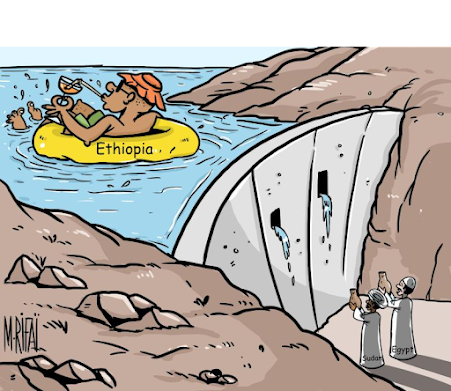SPLASH LANDING
(Sketchplations, n/a)
That’s a wrap! Throughout my 7 blogs I have explored the effects of dam construction on food in Africa as exemplified by the fragile and variable Nile and Omo-Turkana Basins, alongside an undeniable overlap on the impact of hydropolitics on transboundary water basins.
Both basins hyper-dependence upon their waters to provide reliable flows to water-stressed and food-insecure regions, together with controversial colonial legacies and a herd of selfish foreign leaders has made them perfect examples to unpack the complexities in achieving food security through dam construction within transboundary basins. The Tragedy of the Commons perfectly sums up the self-interest dam construction creates, with countries resorting to violence, all in hopes of food security. There’s a shared pool of limited resources, thus the construction of dams to increase food security in one region, can jeopardise security somewhere else.
What I’ve Learnt
- When I began this blog, like most, I thought that global law were set in stone, immutable and with serious repercussion if broken…that’s not the case. From GERD to Gibe III, both highlighted the biggest problem with water management is that the lack of consistency, enforcement and collaboration by the international water law systems (Giordano & Wolf 2002). With sanctions and repercussions for illegitimate practices, a normative framework for shared freshwater can be produced.
- Another key finding from my research is that collaborations between the public, private, the third sector and communities are fundamental for sustainable water and food management. International bodies must be as boundaryless and dynamic as the water which flows in the Nile, mirroring the very medium they try to trap may lead to cooperation and compromising for one another, for example through the Integrated Water Resources Management (IWRM).
- Once again, the Government isn’t always right. People centred development, involving individual community projects could have just as big of an impact as megaprojects. When dealing with a river like the Nile, which has been a staple of food production in Africa since the dawn of time, it is crucial to unpack what practices have been passed down for generation to generation to maintain livelihood in such a challenging environment. Learning from locals such as the indigenous tribes could work in governing bodies favour
Desperate Times, Desperate Measures
Although dams present expected hydrological and ecological constraints on water resources, they also serve as a saving grace for regions at their last resort, desperately try to feed their citizens in the face of climate change. They catalyse the opportunity for countries to diversify their water portfolio and focus their resources and capital to other industries, stunting development. As a result, transboundary water pressures are eased, political tensions are reduced, and everyone's water and food security is improved.



Great to see how your personal narrative as a writer came out and changed as you progressed through the posts. The variety of media and resources always kept me engaged as did the questions at the end of the post- Thanks for the blog!!!!!
ReplyDeleteIt was a pleasure! I hope you learnt something new, I sure did!
Delete